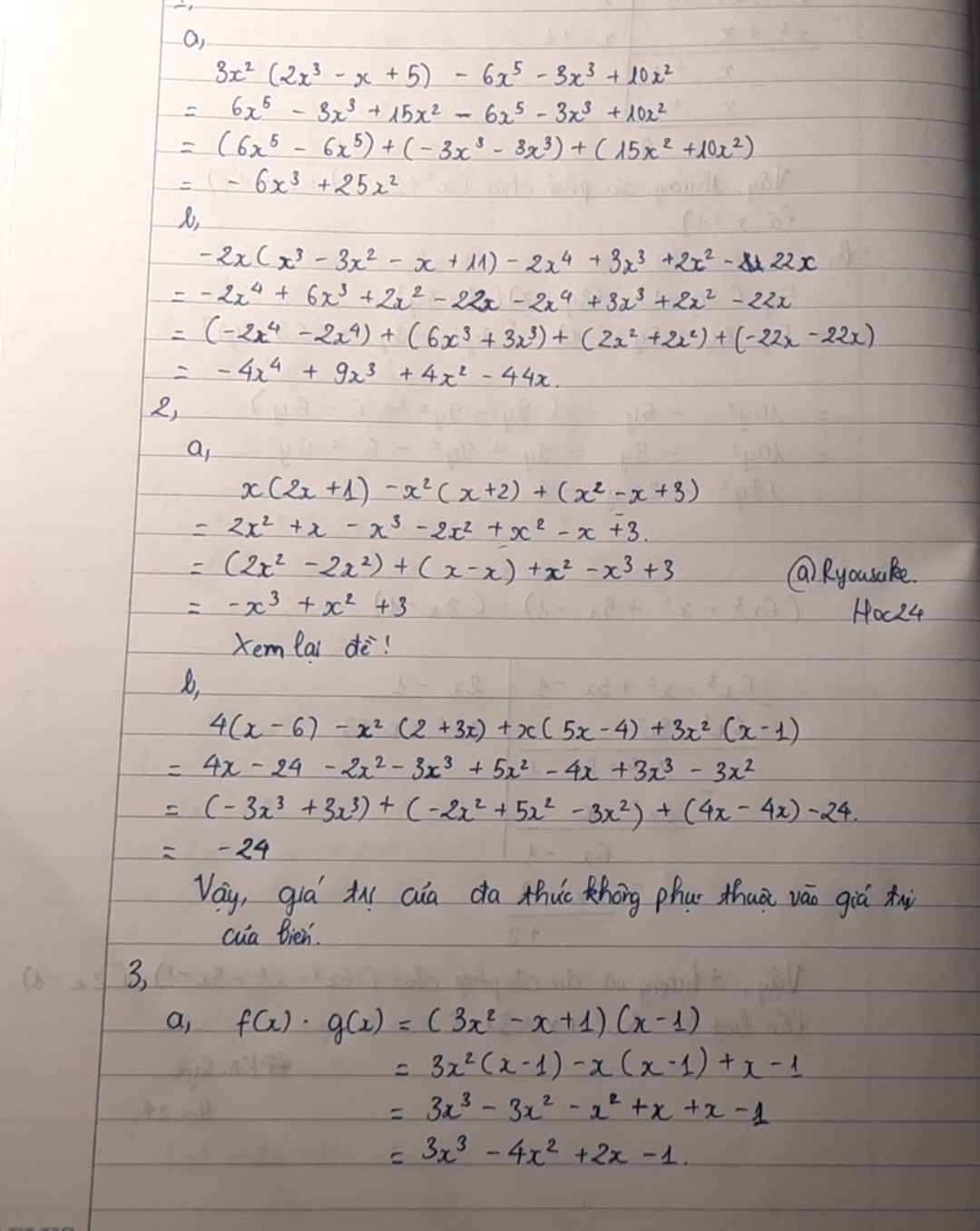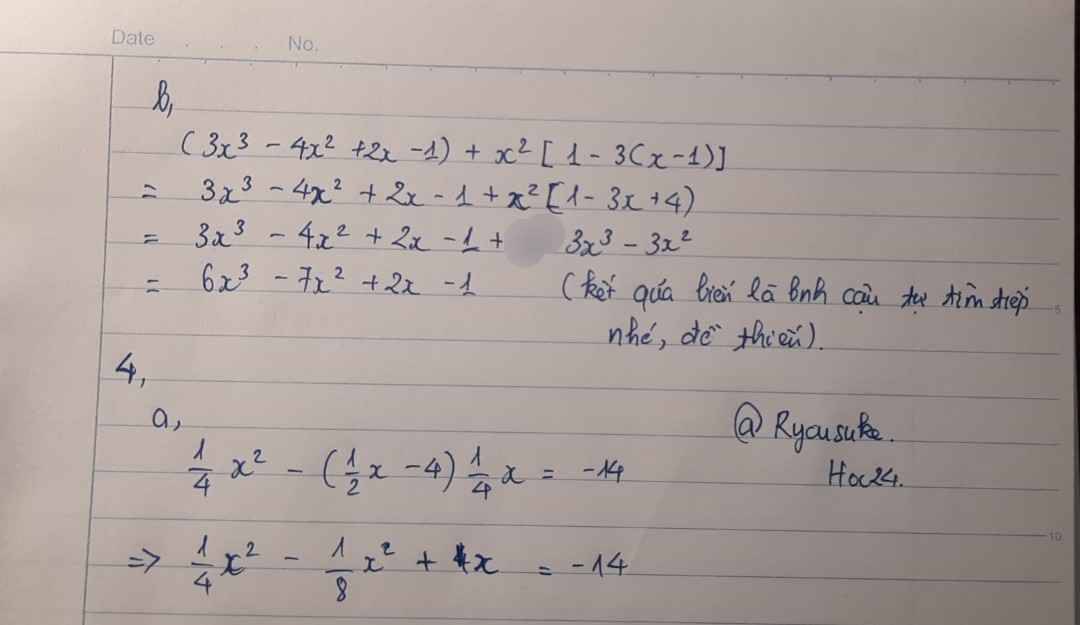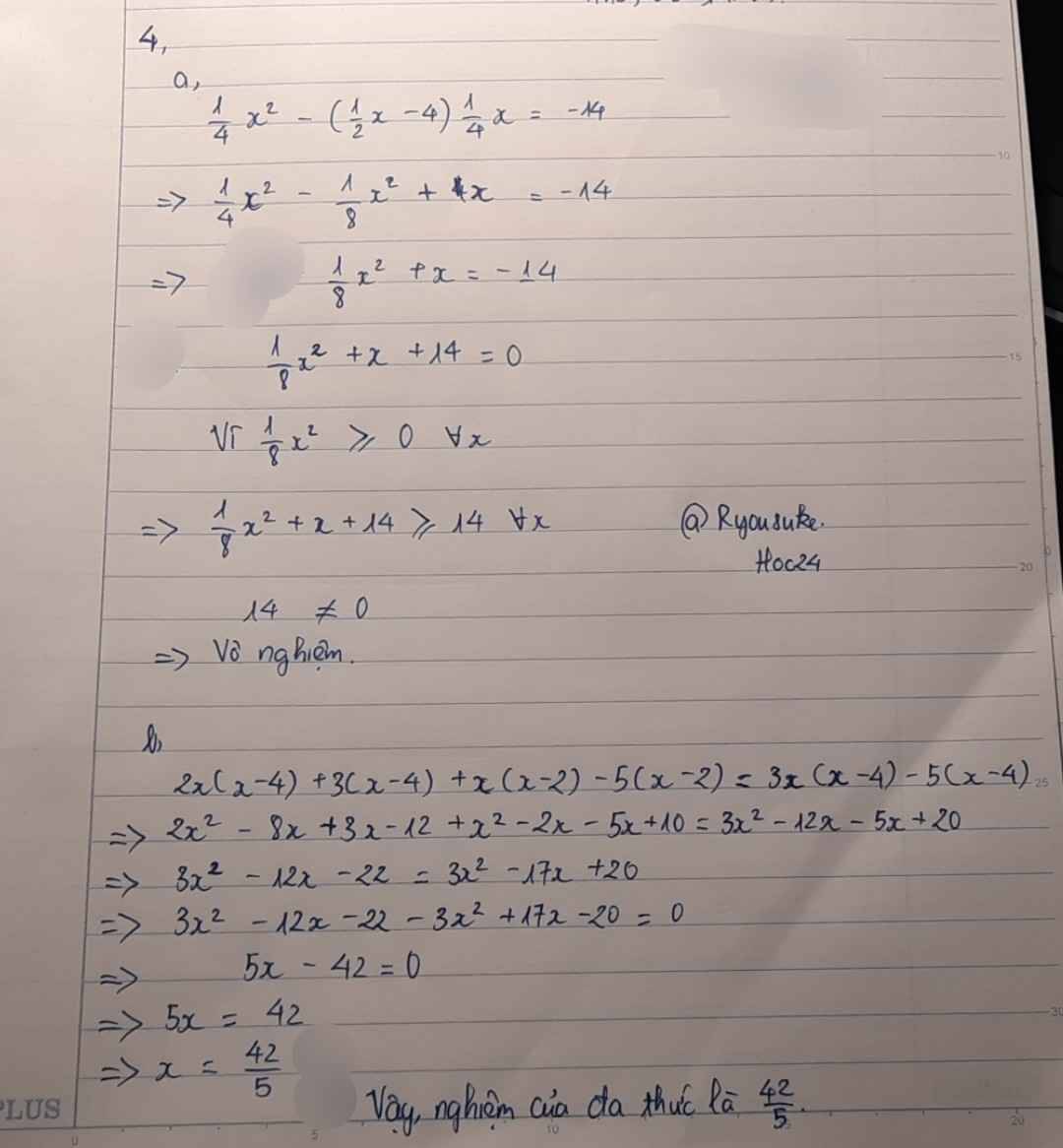Chứng minh đa thức sau x^4+x^3+x+1/ x^4-x^3+2x^2-x+1 = (x+1)^2 /x^2+1
Hãy nhập câu hỏi của bạn vào đây, nếu là tài khoản VIP, bạn sẽ được ưu tiên trả lời.


Trình bày đề bài cho dễ nhìn bạn eyy :v
Khó nhìn như này thì God cũng chịu -.-

\(P\left(x\right)=\dfrac{1}{2}x^3-\dfrac{1}{2}x^4+\dfrac{1}{2}x^2+\dfrac{1}{2}x^4-x^2=-\dfrac{1}{2}x^3+\dfrac{1}{2}x^2=-\dfrac{1}{2}x^2\left(x-1\right)\)
Vì x(x-1) chia hết cho 2 với mọi số nguyên x
nên P(x) luôn là số nguyên nếu x nguyên

P(x) = \(2x^2+1\)
Ta có \(2x^2\ge0\forall x\)
=> \(2x^2+1\ge1>0\)
Vậy đa thức P(x) vô nghiệm
Q(x) = \(x^4+2x^2+1\)
Ta có \(x^4+2x^2\ge0\forall x\)
=> \(x^4+2x^2+1\ge1>0\)
Vậy đa thức Q(x) vô nghiệm
M(x)= \(x^2+2x+3\) = \(x^2+x+x+1+2\)
= \(x\left(x+1\right)+\left(x+1\right)+2\)
= \(\left(x+1\right)^2+2\)
Ta có \(\left(x+1\right)^2\ge0\forall x\)
=> \(\left(x+1\right)^2+2\)\(\ge2>0\)
Vậy đa thức M(x) vô nghiệm
P(x)=2x2+1
Do 2x2\(\ge0\Rightarrow P\left(x\right)=2x^2+1\ge0+1=1>0\)
Vậy đa thức P(x)=2x2+1 không có nghiệm
Q(x)=x4+2x2+1=\(\left(x^2\right)^2+2x^2+1\)
Do \(\left(x^2\right)^2\ge0\) và 2x2\(\ge0\)\(\Rightarrow Q\left(x\right)=x^4+2x^2+1=\left(x^2\right)^2+2x^2+1\)\(\ge0+0+1=1>0\)
Vậy đa thức Q(x)=x4+2x2+1 không có nghiệm
M(x)=x2+2x+3=x2+x+x+1+2=x(x+1)+(x+1)+2=(x+1)(x+1)+2=(x+1)2+2
Do (x+1)2\(\ge0\)\(\Rightarrow M\left(x\right)=x^2+2x+3=\left(x+1\right)^2+2\)\(\ge0+2=2>0\)
Vậy đa thức M(x)=x2+2x+3 không có nghiệm
N(x)=x2-4x+5=x2-2x-2x+4+1=x(x-2)-2(x-2)+1=(x-2)(x-2)+1=(x-2)2+1
Do (x-2)2\(\ge0\) \(\Rightarrow\)N(x)=x2-4x+5=(x-2)2+1\(\ge0+1=1>0\)
Vậy đa thức N(x)=x2-4x+5 không có nghiệm

\(f\left(x\right)=5x^3+2x^4-x^2+3x^2-x^3-x^4+1-4x^3\)
\(f\left(x\right)=\left(5x^3-x^3-4x^3\right)+\left(2x^4-x^4\right)+\left(-x^2+3x^2\right)+1\)
\(f\left(x\right)=x^4+2x^2+1\)
Cho \(f\left(x\right)=0\)
\(\Rightarrow f\left(x\right)=x^4+2x^2+1=0\)
Ta có:
\(x^4\ge0\)
\(2x^2\ge0\)
Do đó:
\(x^4+2x^2+1\ge0+1\)
\(x^4+2x^2+1\ge1\)
=> Vậy đa thức \(x^4+2x^2+1\) = \(5x^3+2x^4-x^2+3x^2-x^3-x^4+1-4x^3\) vô nghiệm.

Lời giải:
ĐK....................
a)
\(\frac{a^3-4a^2-a+4}{a^3-7a^3+14a-8}=\frac{(a^3-4a^2)-(a-4)}{(a^3-4a^2)-(3a^2-12a)+(2a-8)}=\frac{a^2(a-4)-(a-4)}{a^2(a-4)-3a(a-4)+2(a-4)}\)
\(=\frac{(a-4)(a^2-1)}{(a-4)(a^2-3a+2)}=\frac{a^2-1}{a^2-3a+2}=\frac{(a-1)(a+1)}{(a-1)(a-2)}=\frac{a+1}{a-2}\) (đpcm)
b)
\(\frac{x^4+x^3+x+1}{x^4-x^3+2x^2-x+1}=\frac{(x^4+x^3)+(x+1)}{(x^4+x^2)-(x^3+x)+x^2+1}=\frac{x^3(x+1)+(x+1)}{x^2(x^2+1)-x(x^2+1)+(x^2+1)}=\frac{(x+1)(x^3+1)}{(x^2+1)(x^2-x+1)}\)
\(=\frac{(x+1)(x+1)(x^2-x+1)}{(x^2+1)(x^2-x+1)}=\frac{(x+1)^2}{x^2+1}\) (đpcm)
Lời giải:
ĐK....................
a)
\(\frac{a^3-4a^2-a+4}{a^3-7a^3+14a-8}=\frac{(a^3-4a^2)-(a-4)}{(a^3-4a^2)-(3a^2-12a)+(2a-8)}=\frac{a^2(a-4)-(a-4)}{a^2(a-4)-3a(a-4)+2(a-4)}\)
\(=\frac{(a-4)(a^2-1)}{(a-4)(a^2-3a+2)}=\frac{a^2-1}{a^2-3a+2}=\frac{(a-1)(a+1)}{(a-1)(a-2)}=\frac{a+1}{a-2}\) (đpcm)
b)
\(\frac{x^4+x^3+x+1}{x^4-x^3+2x^2-x+1}=\frac{(x^4+x^3)+(x+1)}{(x^4+x^2)-(x^3+x)+x^2+1}=\frac{x^3(x+1)+(x+1)}{x^2(x^2+1)-x(x^2+1)+(x^2+1)}=\frac{(x+1)(x^3+1)}{(x^2+1)(x^2-x+1)}\)
\(=\frac{(x+1)(x+1)(x^2-x+1)}{(x^2+1)(x^2-x+1)}=\frac{(x+1)^2}{x^2+1}\) (đpcm)



\(\frac{x^4+x^3+x+1}{x^4-x^3+2x^2-x+1}=\frac{\left(x+1\right)^2}{x^2+1}\)
Ta có :
\(\frac{x^4+x^3+x+1}{x^4-x^3+2x^2-x+1}=\frac{\left(x^4+x^3\right)+\left(x+1\right)}{\left(x^4+x^2\right)-\left(x^3+x\right)+x^2+1}\) \(=\frac{x^3\left(x+1\right)+\left(x+1\right)}{x^2\left(x^2+1\right)-x\left(x^2+1\right)+\left(x^2+1\right)}\)
\(=\frac{\left(x+1\right)\left(x^3+1\right)}{\left(x^2+1\right)\left(x^2-x+1\right)}\)
\(=\frac{\left(x+1\right)\left(x+1\right)\left(x^2-x+1\right)}{\left(x^2+1\right)\left(x^2-x+1\right)}=\frac{\left(x+1\right)^2}{x^2+1}\left(đpcm\right)\)
Chúc bạn học tốt !!!